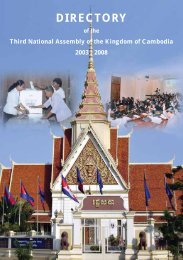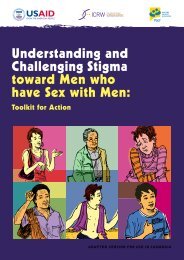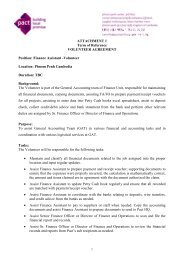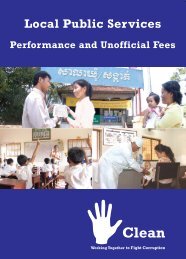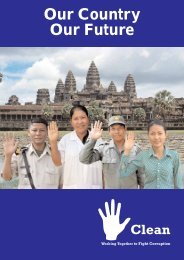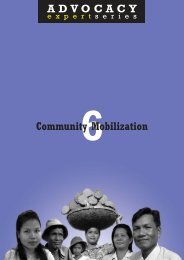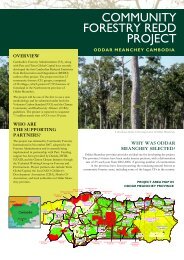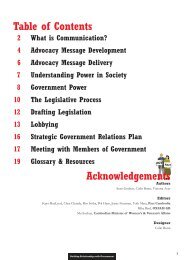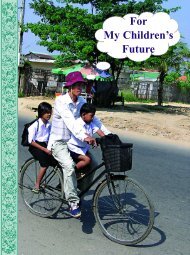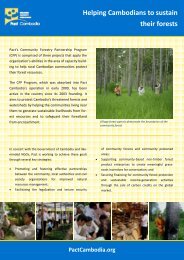Advocacy in Cambodia: Increasing Democratic ... - Pact Cambodia
Advocacy in Cambodia: Increasing Democratic ... - Pact Cambodia
Advocacy in Cambodia: Increasing Democratic ... - Pact Cambodia
Create successful ePaper yourself
Turn your PDF publications into a flip-book with our unique Google optimized e-Paper software.
Increas<strong>in</strong>g <strong>Democratic</strong> Space<br />
existence of an <strong>in</strong>ternational labor code promoted<br />
by the ILO.<br />
Some assert that atta<strong>in</strong><strong>in</strong>g a policy change<br />
depends on the extent to which the change<br />
threatens political power. For example, while the<br />
domestic violence law may prove to be surpris<strong>in</strong>g<br />
and perhaps even disquiet<strong>in</strong>g to <strong>Cambodia</strong>n men,<br />
the affects are limited to the man and woman <strong>in</strong><br />
question and therefore do not encroach on the<br />
political sphere of government officials. This may<br />
expla<strong>in</strong> why it has been possible for NGOs and the<br />
M<strong>in</strong>istry of Women’s Affairs to move the domestic<br />
violence agenda forward. Similarly, lobby<strong>in</strong>g by<br />
NGOs to update the Family Law is not likely<br />
perceived as a threat.<br />
By contrast, NGOs have also had <strong>in</strong>put <strong>in</strong>to a<br />
number of legislative bills such as the new land<br />
law, community fisheries law, forestry law, penal<br />
code, and others, which are much tougher to deal<br />
with because they directly threaten the livelihoods<br />
of some government officials. Therefore, it comes<br />
as little surprise that legislation was <strong>in</strong>itiated by<br />
donors with leverage, such as the multilateral<br />
banks. The only “tough” issue <strong>in</strong>itiated solely by<br />
NGOs was the Commune Council Election Law<br />
lobby<strong>in</strong>g issue, which advocated unsuccessfully for<br />
changes <strong>in</strong> the draft commune council election<br />
law. This campaign is considered ongo<strong>in</strong>g.<br />
As mentioned elsewhere <strong>in</strong> this report, the<br />
executive and m<strong>in</strong>isterial directives<br />
(proclamations, sub-decrees, circulars, etc.) that<br />
are passed to support new or modified legislation<br />
are as important, if not more important, than the<br />
laws themselves because they <strong>in</strong>clude details on<br />
implementation. Until recently civil society groups<br />
had limited <strong>in</strong>put <strong>in</strong>to these policies because they<br />
were not able to access the legislative process.<br />
Now, NGOs are able to jo<strong>in</strong> government work<strong>in</strong>g<br />
groups to discuss directives, for example on land<br />
law sub-decrees. NGO access to sub-decree<br />
work<strong>in</strong>g groups relies heavily on personal contacts<br />
rather than on <strong>in</strong>stitutional procedures and is<br />
therefore not guaranteed as a consultative<br />
procedure. Because sub-decrees are so important,<br />
it is imperative for NGOs to advocate for their<br />
<strong>in</strong>put to be <strong>in</strong>stitutionalized through the legislative<br />
process.<br />
Legislation does not readily translate <strong>in</strong>to<br />
enforcement, as demonstrated by the poor<br />
implementation of prov<strong>in</strong>cial sub-decrees on the<br />
reduction of private fish<strong>in</strong>g concessions<br />
that led to higher number of conflicts at<br />
the local level. When disputes arise,<br />
NGOs form networks to assist pla<strong>in</strong>tiffs.<br />
NGOs facilitate meet<strong>in</strong>gs between groups<br />
of villagers and prov<strong>in</strong>cial or department<br />
authorities. Human rights and legal<br />
services NGOs assist with court cases.<br />
The consensus is that cases brought aga<strong>in</strong>st<br />
companies or military officials are not resolved <strong>in</strong><br />
favor of the pla<strong>in</strong>tiffs. Occasionally, however,<br />
NGOs and local activists have been able to<br />
negotiate a solution with authorities or organize<br />
sufficiently to put violators <strong>in</strong> check. As<br />
communities become <strong>in</strong>creas<strong>in</strong>gly frustrated with<br />
the lack of effective government action and their<br />
situation becomes more desperate, they are<br />
<strong>in</strong>creas<strong>in</strong>gly tak<strong>in</strong>g matters <strong>in</strong>to their own hands<br />
to put a halt to violations.<br />
There are clear examples of advocacy<br />
campaigns hav<strong>in</strong>g an impact on policy<br />
formulation. There is a need to <strong>in</strong>stitutionalize the<br />
<strong>in</strong>teraction between civil society and the<br />
government through the creation of consultative<br />
procedures. These procedures will help def<strong>in</strong>e how<br />
civil society and government can work together<br />
to create policies that reduce conflict with affected<br />
communities.<br />
Enlarg<strong>in</strong>g <strong>Democratic</strong> Space<br />
Civil society organizations have had to press<br />
for the right to give <strong>in</strong>put to new legislation at each<br />
step. They have been assisted <strong>in</strong> their efforts by<br />
policies of the multilateral banks that <strong>in</strong>sist on<br />
government consultation with civil society –<br />
policies that came about because NGOs lobbied<br />
the banks at the <strong>in</strong>ternational level throughout the<br />
1980s and 1990s. The idea of consultation is<br />
difficult for government officials because they feel<br />
threatened and it represents a new way of work<strong>in</strong>g<br />
<strong>in</strong> collaboration with civil society.<br />
In cases where there has been serious<br />
engagement between civil society organizations<br />
and government policy makers, the process has<br />
not been smooth but the outcome has usually been<br />
satisfy<strong>in</strong>g to all sides. In present<strong>in</strong>g the draft<br />
community fisheries sub-decree to the M<strong>in</strong>istry<br />
of Agriculture, the Department of Fisheries was<br />
able to feel confident that they listened to all<br />
arguments and produced the most reasonable<br />
draft. When the M<strong>in</strong>istry then altered the draft<br />
and removed many of the provisions respond<strong>in</strong>g<br />
to the communities’ requests, the Department of<br />
Fisheries was able to exert its <strong>in</strong>fluence and to get<br />
some of the articles put back to protect the<br />
<strong>in</strong>tegrity of community groups.<br />
The fisheries example highlights the effect of<br />
us<strong>in</strong>g a bottom-up approach to policy mak<strong>in</strong>g: if<br />
In cases where there has been serious engagement<br />
between civil society organizations and government<br />
policy makers, the process has not been smooth but<br />
the outcome has usually been satisfy<strong>in</strong>g to all sides.<br />
30



